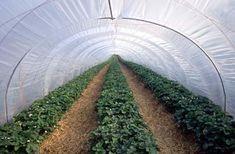
A three-day hearing in Godalming, Surrey, this week, has the potential to change the face of UK horticulture.
On February 1-3, the Planning Inspector heard an appeal by soft-fruit grower Hall Hunter Partnership (HHP) against an enforcement order issued by its local council. The notice requires HHP to remove the polytunnels it uses to protect crops at its Tuesley Farm near Godalming, along with temporary accommodation made available for seasonal workers.
Until now, the erection of temporary polytunnel structures has not required planning permission. HHP managing partner Mark Hall believes the future of soft-fruit production in the UK hangs on the inspector's decision.
"Polytunnels are essential if we and other UK growers are to continue to supply the supermarkets with high quality, domestically-grown berries," Hall said.
Potentially, growers of other crops that also depend on the use of polytunnels could be similarly affected. Laurence Olins, chairman of British Summer Fruits, said that record soft-fruit sales of £172 million in the UK last year, could not have been achieved without the use of polytunnels to protect the crop and extend the growing season.
Hall added that only one outcome can guarantee a future for the industry. "Unless the inspector concludes that planning consent is not required under current legislation, he will set a precedent that will be acted upon by officials around the country. Then, growers will have to spend massive amounts of time and money dealing with planning applications."
There is no guarantee that those applications will be granted because many "interested parties" will have opportunities to object.
The enforcement notice issued against HHP demonstrates how a small number of activists can influence planning policy, said Hall. "There's no doubt that it has been raised at the instigation of a number of people who live near Tuesley Farm and, like Monty Don in Herefordshire, disapprove of polytunnels.
"This group complains that we are 'destroying the rural character of the area during the summer months for everybody'. They are also making misleading and inaccurate claims about our use of agricultural chemicals, water extraction and seasonal labourers."
Mark Hall's son Harry runs Tuesley Farm, and said he has worked with local authorities and residents to minimise the impact of the farm's operations while continuing to farm profitably.
"One of the first things we did when we started in 2003 was to draw up a strategic farm plan that includes an environmental scheme designed by FWAG and is supported by local wildlife groups," he said.
"We are planting more than 10 kilometres of indigenous hedging and beetle banks, as well as copses and woodland areas that will soon screen the polytunnels from view. And we have done all this with the support of the industry including the NFU, British Summer Fruits, the retailers and many other growers."
As for water extraction and crop protectants, HHP has recently been granted a licence by the Environment Agency. The company claims to view spraying very much as a last resort and is actively involved in researching and trialing alternative, environmentally benign crop protection methods.
It also points to external recognition of its environment-friendly policies. HHP has been acknowledged by Biological Crop Protection Ltd, the UK's leading supplier of beneficial insects, as being "..very much at the forefront of using biological controls to minimise the use of pesticides while still producing top quality soft fruit." And a landscape and environmental assessment by an independent horticultural consultant stated that Harry hall is in fact re-creating the original, enclosed landscape typical of the area.
The challenge for growers, said Mark Hall, is to find ways to deal sensitively not just with the environment but with a new population that uses the countryside as an idyllic dormitory. "Our farming methods have changed considerably over the past decade or so, but our neighbours have changed too," he said. "We need to recognise this and promote farming practices that meet the concerns of the wider community."
HHP, he added, is working towards this goal by building on the code of practice for polytunnels and temporary accommodation facilities that was initially developed by South Herefordshire growers.
But the friction between farmers and country-dwelling city workers will not end even if HHP wins the appeal, he concluded. "Unless the industry as a whole gets together and takes a grip on the situation, it's highly likely that there will be legislation to make agricultural structures such as polutunnels, temporary accommodation, pig arcs and so on subject to planning regulations. This would lead to significant restrictions on farming activities across the country."



